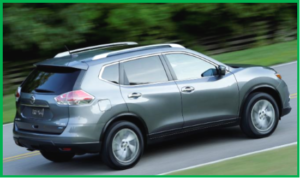The gremlins of recalls are once again running amok as Nissan, Toyota, GM, Hyundai and Mercedes-Benz have filed notices of safety defects with the National Highway Traffic Safety Administration. In the required documents that were just made public by NHTSA, a variety of root causes for dangerous defects are in play. There are recalls for bad chemistry in airbag inflators, weak welds, corrosion, and the increasingly problematic software programming bugs that render airbags inoperative.
 The most serious safety defect this week comes from Nissan recalling 108,503 model-year 2014-2016 Rogue because the rear-lift gate support stays may corrode due to faulty anti-corrosion treatment. Corrosion of one or both of the stays can cause a sudden release of pressure. If this occurs, the support stays may break off, increasing the risk of injury. Potentially this is the Japanese equivalent of a guillotine. Rogue, ironically, was jointly developed using the Nissan/Renault Common Module Family (CMF) platform.
The most serious safety defect this week comes from Nissan recalling 108,503 model-year 2014-2016 Rogue because the rear-lift gate support stays may corrode due to faulty anti-corrosion treatment. Corrosion of one or both of the stays can cause a sudden release of pressure. If this occurs, the support stays may break off, increasing the risk of injury. Potentially this is the Japanese equivalent of a guillotine. Rogue, ironically, was jointly developed using the Nissan/Renault Common Module Family (CMF) platform.
The anti-corrosion treatment of the outer tube on the rear-lift gate stay was altered from specification by the supplier, Showa Auto Parts Company, resulting in an insufficient coating. The rear lift gate stay provides power assist to the rear lift gate and operates under high pressure gas.
Toyota Motor Engineering & Manufacturing is recalling 58,515 model-year 2016 Avalon and Camry vehicles because e occupant classification system (OCS) that activates or deactivates the front passenger seat air bag system may have been improperly calibrated. As a result, the front passenger airbag and the front passenger knee airbag may not deploy as intended. These Toyota’s fail to comply with Federal Motor Vehicle Safety Standard (FMVSS) number 208, “Occupant Crash Protection.” To state the obvious, airbags that do not deploy as intended during a crash increase the risk of injury.
Hyundai Motor Company is recalling 33 model-year 2015-2016 Sonata vehicles and one 2016 Sonata Hybrid vehicle because the driver’s front airbag may be missing a chemical enhancer required for the second stage air bag deployment, resulting in the second stage not deploying in certain crashes. The primary stage will deploy as intended.
General Motors is recalling 4,789 model-year 2016-2017 Chevrolet Silverado 1500 and 2016 Cadillac Escalade, Cadillac Escalade ESV, Chevrolet Suburban, Chevrolet Tahoe, GMC Sierra, GMC Yukon and GMC Yukon XL vehicles. The front upper control arms may have inadequate welds near the control arm bushing. This allows the control arm to separate from the bushing, “compromising steering and increasing the risk of a crash.”
Multimatic Inmetmatic from Mexico is responsible for the potentially deadly suspension parts. The presumptive Republican presidential nominee Donald Trump, of course, is openly hostile to Mexico and the NAFTA treaty as destroying U.S. jobs. This has potentially far ranging consequences for auto companies.
Mercedes-Benz USA is recalling 223 model year 2016 SLK300 vehicles equipped with a nine-speed automatic transmission. The backup power supply for the ignition switch may not have been properly connected. As a result, if the vehicle is being driven and there is a loss of power from the main vehicle battery, the transmission cannot be shifted to “Park” nor can the electric parking brake be applied. With this safety defect without the backup power supply, the only way to keep the vehicle from moving is to press the brake pedal. As soon as the driver attempts to exit the vehicle, the vehicle may roll, increasing the risk of injury.

